A Conversation with Julia Scotti & Susan Sandler (JULIA SCOTTI: FUNNY THAT WAY)
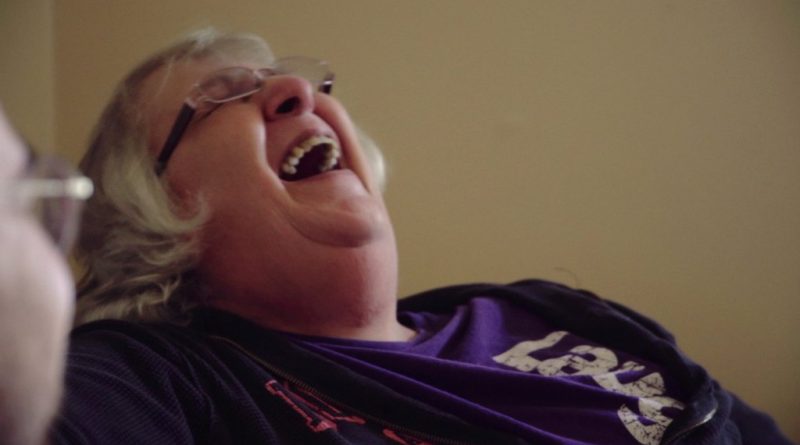
The great thing about pride month is that the films we seem to be waiting 11 months out of the year for, suddenly arrive all at once. Julia Scotti is the headlining comedian that most people would know through America’s Got Talent or the Showtime special More Women Of A Certain Age. But that’s never going to be the most important thing about Julia Scotti or her comedy. Julia performed for years under another name, and under another gender. For years she toured the country appearing at venues all over the United states and Canada as Rick Scotti, until leaving her chosen profession in 2000 to begin her transition, working as a teacher and stepping away from comedy entirely for 10 years. Reintroducing herself in comedy in 2011 she has been described as a cross between Sam Kinison an Mrs. Doubtfire and very quickly was named one of the top five transgender comedians in the country by Advocate magazine.
Documentary director Susan Sandler first met Julia Scotti first in performance. She witnessed an extraordinary evening of her work on stage at the Dreamland Theater in Nantucket, and got to hang out afterwards because a friend produced the bill, the wonderful comedian Jane Condon. Sandler and Scotti just connected. “This is somebody I want to work with,” she thought.
Last year the documentary they made together, Julia Scotti: Funny that Way charmed festival audiences in cities all around the world, bringing a little live comedy experience it’s to a world stuck at home during the pandemic. I got to meet the two artists when the film played the festival I was working at so when I heard it was getting its national release, I jumped at the excuse to reconnect with these two powerhouse women.
Hammer to Nail: Susan, at the time, what did you think about her comedy that made it so distinctive?
Susan Sandler: She has and gave the audience that night a combination of real, truth, and energy, and surprise, and a kind of urgency that tasted like early Richard Pryor to me. It had that sense of…you just were completely captivated because it was so real and so funny and so truthful, all of those things.
HtN: Julia, have you ever thought that anybody would want to make a documentary about your life in the past? Did you ever consider that as a possibility?
Julia Scotti: No, I never thought I was that interesting. It’s one thing when you’re living your life and you just trying to get through day to day and then an objective outsider comes in and goes, “Why are you even still alive after going through all of that?” I sit back and go, “I don’t know. Let’s find out.” That’s how the movie…that’s how I got interested.
HtN: Did you feel ready to let somebody into your story?
JS: I wasn’t. To be perfectly honest with you, I’m very distrustful of people. So it’s a testament to Susan’s character and her honesty. When she promised me she would handle my story with dignity and class, and that’s exactly what she did. But you take it on a leap of faith. We went into formal agreement, and once that’s signed, she could have done anything. Well, I had to believe that she was going to be true to her work, and she was.
HtN: Was there anything that you were surprised at as you went through the process yourself? Anything that jumped out to you as a moment where you’re like, “Oh, I didn’t think I would feel this,” or “I hadn’t thought about that for awhile?“
JS: Yeah, there were two places. The one that everybody brings up in every interview, the one where I’m watching myself from years before talking about the trans woman on…I forget which talk show it was in. And then realizing that I was going through that issue. I was going through the process of denial even back then and sort of countering it with the oldest bravado and whatnot. And the other part was Kate, the conversation with Kate [Julia’s third ex-wife, Kate, appears in the film but by audio-only]. To hear her voice after all these years and hearing it that heartfelt kind of hit me, yeah.
HtN: How long did you guys work on this? When did you decide to make the film? When did you start rolling cameras? How long was the process?
SS: Well, we met in the summer of 2015. The process was kind of beginning of a friendship. We exchanged…with materials, Julia showed me some writing that she was working on. We started working on an idea for a one-woman show, and I was going to just basically guide her and bring her to a theater company that I’m a member of and sort of mentor the
project. And the more I learned about her story, the more I realized that it wanted to be a documentary. So it was a step by step by step awareness of the breadth of her story and how wonderful she is, and then approaching the idea of the documentary. We had no idea it was going to be a five-year journey. I mean that my background is in narrative film and the idea of what documentary asks of a filmmaker, and in this case, I also produced it.
HtN: Did you start editing as you were going? I mean, how did you keep track of what you had and what you wanted to get? Because I know there’s so many different ways you can put together a documentary. I feel like it’s like at the start of a project, you either know exactly what you want to do or you’re so open to the possibilities that there’s almost too many ways to go about it. So…
SS: Well, the archival materials that Julia shared with me which were sometimes not in great shape, these are comedy routines that were shot very simply with cameras in the backs of clubs sometimes. And the material itself wasn’t necessarily well-preserved, so converting all of that. The exciting material was what I discovered buried in the middle of a demo reel, where Julia would make multiple copies of comedy reel, there would be a home movie gem because there was no blank tape so the demo reel got used for that. So I was going on these digs, these archeological digs, into the stacks of the old demo tapes to find these little pockets of wonderful archival material.
But your question about finding the spine of the film…I worked very closely with my editor. I was in the editing suite every day with her, and I looked at the footage before I prepared what were essentially paper edits for every session. So I knew what I wanted, and we began working almost in a kind of guided by Julia’s voice. She uses her life in her material and the combination of what she does on stage and how that reflects her lived experience became the map for the storytelling. The people that we got to talk to along the way and the people who came into her life, the verité material was very much generated by the events of her life. The idea of adding animation was kind of organic to the tone of the storytelling. This is a person whose voice is vibrant and comedic, and it lends itself to animation.
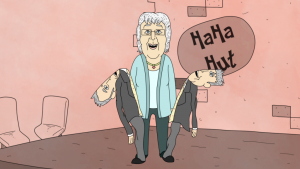
An animation still from “Julia Scotti: Funny That Way”
So, figuring out where that animation wanted to fall and working with a very gifted animator, Sam Roth, and creating Julia as an animated figure, and then understanding where that animation was most useful in the film and would come alive most usefully. All of those pieces. I had a wonderful composer who I worked with very early on, so I never worked with temp music. So, got to understand the rhythm of the film very much through having a score that was alive cut by cut by cut. It was editing sequences that felt very contained, but really discovering the spine almost by the chapters that she leads us to, in her voice, in her comedy. That was very much the narrative spine.
HtN: Julia, what kind of conversations did you have with the people in your life about the project that you were doing, and asking them to be involved in the project and be okay with you revealing everything about yourself and, of course, they have to come along with it. Really, you’re telling other people’s stories too.
JS: Well, there were some people that just said, “No, thank you,” and not for any other reason, that they just didn’t want their lives put out to the public. My children, on the other hand, were very cooperative, and they surprised me. I didn’t think they would agree to it, but they did. So I’m grateful to them. You could see that the relationship has sort of reestablished itself. Comedians will do anything to get on camera.
HtN: So true.
JS: So I knew that when we had the breakfast, everybody would show up, and they did. They’re wonderful people there. They’re my extended family, I should say. Aside from my kids, really, they’re my true family. I love my brother and sister comedians. They’re just very special people.
HtN: I get to ask this next question because I’m trans.
JS: There you go.
HtN: If somebody were to come to me with the project and say, “I want to do something about your life,” my first thought would be like, “Well, I am past the old part of my life and I’m not sure I want my…” Even if people know my old name, my old life, what I look like, I’m not sure I want that in a video with how I look now and who I am and how I…there’s one thing to tell your story. There’s another thing to be kind of confronted with yourself from the past. Did you think about that? How did you feel about that? Because I know that would be a very difficult decision for me, personally.
JS: It’s a great question. It’s one that I did struggle with at the beginning of the process. I’m in a weird situation because I’m in a very public job. So even if I had decided, “No, I don’t want to do this because I don’t want anyone to know about my past,” that would have been okay if I had been a teacher or plumber or whatever. But I’m a comedian and there’s plenty of stuff on the internet about me. It doesn’t take a whole lot of digging to find the old me there. And so I thought, “Well, all right, that’s already out there. I’m not going to run from it.” Then I also said, “If I hide who I was, then I traded one person for another.” I am the sum total of everything I’ve ever experienced, every moment I’ve ever lived, and that includes being Rick Scotti. So I’m not ashamed of my past. I think it helps people to understand by seeing this movie and seeing the transition, what we go through as trans people, maybe in part. My experience is not typical, but it’s not atypical either.
HtN: Susan, for you…I mean, it’s a big responsibility to take on a story like this, and one of the things I always… as someone who runs a Queer film festival, I’ll get really suspicious of somebody who’s a straight director turning in a film about our culture. And I think no matter what, you are never going to fully understand Julia’s life experience. So, that’s a lot of responsibility to take on. Can you talk a little bit about how that felt and how you worked with that?
SS: I appreciate all of that. I appreciate your lens and your sensitivity to what you’re curating at aGLIFF, and I think that’s so important and valuable.
I met Julia artist to artist. That’s how we entered our process, was artist to artist, coming from a place of her creativity and my creativity. And we continue to support each other. I just helped to organize a stage reading of a beautiful play that she’s written. My background is as a playwright. I respect everything about her life, everything about what she does in performance and the integrity of what she does with her circle of friends. And I met her through that circle, through our common friends in comedy. She was speaking earlier about the comedy world being her true family. The people that she’s closest to are her comedy friends.
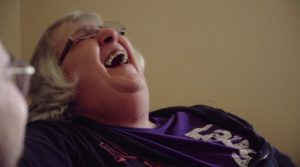
A still from ‘Julia Scotti: Funny That Way”
It was through Jane Condon who brought her to Nantucket where we met, that we met, who was a sister to both of us. So, that’s kind of the sisterhood that I entered, the artistic sisterhood of where we lived. And it was the integrity of what I saw in her work and what I hope she saw in mine that brought us together. I think everything begins with respect. I have enormous respect for her and every turn and I wanted to show her that I was going to bring that to the process, and I’m very grateful that she trusted me.
JS: And if I could jump into that…there’s just this idea that cis people can’t tell our stories for whatever reason. I mean, I don’t buy into that. I think if you’re an artist, if you’re a creative person with a sensitive soul like Susan’s is, you can find your way in. You can tell my story with my assistance, maybe. I mean, Botticelli wasn’t a fat little angel and he still painted these beautiful…
HtN: We don’t know. We’ve never seen pictures of him. I mean, he might be.
JS: He could’ve been a fat little angel, I don’t know. Do you know what I’m saying though?
HtN: Right.
JS: This idea that you have to be trans to tell a trans story kind of eliminates trans folks from playing cis parts in a movie then, if you’re going to use that logic. So I think if our goal…and my goal as a performer is to be able to play any part, to speak on any level. I can speak as a cis person or a trans person. Why should she not be allowed to explore that, too? If we want acceptance, we have to accept. That’s just my feeling.
HtN: Sure.
JS: Is that going to give you any trouble?
HtN: No, no. I think it’s important part of the conversation. I think that this is an issue that is evolving and to me, like I said, frankly, if I don’t have a rule, I just have a sensitivity to it, and I want to know. I want to know what’s going into it. I want to be aware of what the background of what I’m watching. So I truly am able to understand kind of where people are coming from when they’re telling the story. When you saw the film for the first time, Julia, what stuck out to you as like the strongest moment of surprise or something you hadn’t thought about or a way that you felt differently seeing it? What was the moment that just was like, “Oh.”
JS: There wasn’t a road to Damascus kind of moment, but…I’ve made this analogy in other interviews that it’s kind of like going to heaven, and they’re supposed to have this book of your life. And they start thumbing through it and while they’re thumbing through it, you’re going, “Oh, geez. Oh my God, did I, oh my God,” was kind of like that. So seeing my own evolution was revelatory. I mean, I’m like, “I really have come quite a ways,” 40 years, 40 plus years in comedy. So yeah, that’s the takeaway I’ve had from it.
HtN: Susan, when you finished the film, what I always like to know from documentary makers is how did you know that it was done? Because you could still be filming now if you want to do it.
SS: Oh, yeah. Honestly, that’s exactly the addiction. I think, not too far, not too recently… I mean, there was something that you were doing, Julia, that I wanted to shoot. I do. I don’t want to stop. I know the film has finished. I went through the very expensive post, so I know what I can’t touch it, but the addiction continues. I still want to follow you around with a camera. That continues.
Julia Scotti: Funny That Way was reviewed by Melanie Addington here. The film is available now on all platforms.
– Bears Rebecca Fonté (@BearsFonte)

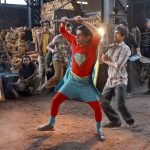
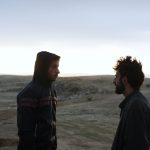

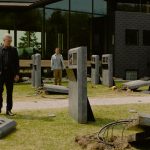



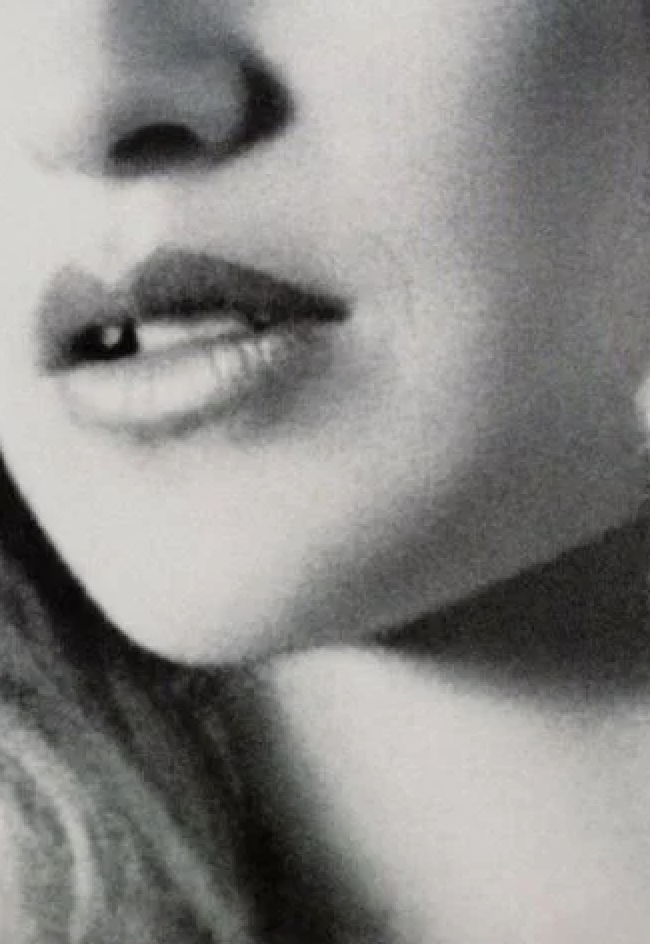
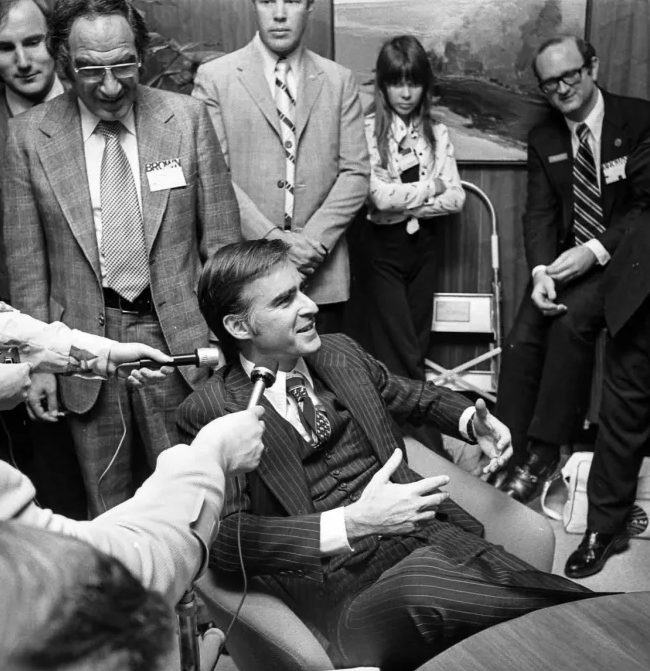


Pingback: LGBTQ Parenting Roundup - Mombian